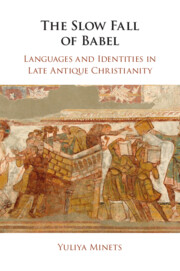Book contents
- The Slow Fall of Babel
- The Slow Fall of Babel
- Copyright page
- Dedication
- Contents
- Abbreviations
- Acknowledgments
- Introduction: Awakening to Linguistic Otherness
- Chapter 1 Meeting the Alloglottic Other: The Socio-Linguistic Landscape of the Ancient Mediterranean and the Spread of Christianity
- Chapter 2 Languages and Identities in Greco-Roman and Jewish Antiquity
- Chapter 3 The Tower of Babel and Beyond: The Primordial Linguistic Situation, the Original Language, and the Start of Linguistic Diversification
- Chapter 4 Speaking in Tongues in Christian Late Antiquity
- Chapter 5 Foreign Languages and the Discourse of Otherness
- Chapter 6 The Languages of Saints and Demons
- Conclusion: What’s in the Language?
- Bibliography
- Index
Chapter 5 - Foreign Languages and the Discourse of Otherness
Published online by Cambridge University Press: 02 December 2021
- The Slow Fall of Babel
- The Slow Fall of Babel
- Copyright page
- Dedication
- Contents
- Abbreviations
- Acknowledgments
- Introduction: Awakening to Linguistic Otherness
- Chapter 1 Meeting the Alloglottic Other: The Socio-Linguistic Landscape of the Ancient Mediterranean and the Spread of Christianity
- Chapter 2 Languages and Identities in Greco-Roman and Jewish Antiquity
- Chapter 3 The Tower of Babel and Beyond: The Primordial Linguistic Situation, the Original Language, and the Start of Linguistic Diversification
- Chapter 4 Speaking in Tongues in Christian Late Antiquity
- Chapter 5 Foreign Languages and the Discourse of Otherness
- Chapter 6 The Languages of Saints and Demons
- Conclusion: What’s in the Language?
- Bibliography
- Index
Summary
The chapter explores language ideologies and various solutions to which Greek, Latin, and Syriac intellectuals resorted when they needed to articulate their attitudes to the alloglottic Other, while forging their distinctly Christian and specific confessional identities. The discussion starts with the views of early Christian apologists on foreign languages and continues by inquiring into further transformations that their initial universalist views underwent in the post-Constantinian era. The chapter highlights the main points of the cultural dialogue between the “Christian universalists” and “cultural isolationists” and analyzes the formation of a distinct rhetoric of alienation of foreign language speakers in Christian discourse. The trend was most visible in the Greek milieu, where the feeling of cultural superiority over “barbarians” had been especially deep-rooted. Then, the chapter explores how representatives of different literary traditions – this especially concerns Latin writers – attempted to promote the status of their own tongues as legitimate and authoritative vehicles for Christian self-expression. The final section analyzes metalinguistic remarks in Syriac literature – remarks that bear witness to acute linguistic awareness among local writers and their ability to resist the major cultural biases of their colleagues from the Classical tradition.
Keywords
- Type
- Chapter
- Information
- The Slow Fall of BabelLanguages and Identities in Late Antique Christianity, pp. 220 - 287Publisher: Cambridge University PressPrint publication year: 2021

